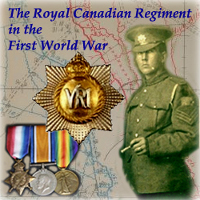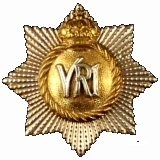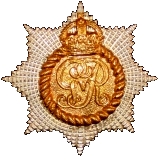
The First World War
An RCR Officer's Diary 1914-1918
SEPTEMBER, OCTOBER 1915
SEPTEMBER 1914
Captain du Domaine, having been promoted Major, relinquished command of his company, on Sept 1st, assuming duties of 2nd Major of the Battalion.
All bayonets were ordered to be file sharpened, it had been found that grinding destroyed their temper.
On Sunday 5th [Sep] two destroyers appeared to act as escort when about 200 miles from Plymouth. The voyage had been fine as a whole and comfortable under existing circumstances. Nothing of particular interest occurred. Considerable practice and great amusement was caused at machine gun practice on porpoises, dead horses, barrels, etc., passed on the voyage.
When off the west coast of Ireland wireless call were repeatedly received asking for whereabouts of the Caledonia, but as no code was used they were evidently calls of the German submarine which torpedoed the unfortunate S.S. Hesperian about 50 miles north of the Caledonia on Saturday evening.
S.S. Caledonia arrived at Plymouth at midnight Sunday September 5th. The battalion disembarked on Tugs on Monday morning 6th, entraining shortly after midday for Shorncliffe. Shorncliffe was reached about 10 p.m. by half the battalion in the first section and a half hour later by the other half battalion in the second section. Having detrained the battalion marched to Quested Farm camp near Cheriton, the weather was wet and the Camp muddy which after a few days became a veritable quagmire.
The next day all the rifles were turned in to ordnance to have the chambers enlarged and handed over to 2nd Cdn. Mtd. Rifles who were just leaving for France.
The Battalion reverted to Imperial Establishments which again (??? three missing words).
Lt Col A.H. Macdonell, D.S.O., arrived in England from H.Q. 1st Cdn. Div., assumed command of the battalion.
Shortly after arrival in England the Company Sergeant Majors introduced by the 4 company organization were promoted Warrant Officer Class II together with the Regimental Quartermaster Sergeant. The Regimental Sergeant Major became a Warrant Officer Class I. The badges of rank of the Regimental Sergeant Major became the Royal Arms, those of the R.Q.M.S. a crown and star, and those of the C.S.M. a crown all worn on the forearms. The badge of rank of a C.Q.M.S. Remained the same, namely 3 chevrons and a crown on the upper arm.
On 10th [Sep] the battalion commenced the Musketry Course with the new rifle, marching order was worn on all parades, officers included, who adopted the web equipment.
On 14th [Sep] the battalion lined the streets at Folkestone as traffic control for the 2nd Cdn. Division which was marching out that night to cross to France.
Capt Garon reported for duty from R.C.D. and took over command of "D" Co. 16th [Sep]. Capt and Brevet Major Eaton, Capt Pope, Capt A.A.S. Law, Capt J.S. Brown, Capt and Temp. Major Smith and Capt Willets were promoted Majors on Sept 16th.
Lieut Campbell, having been appointed Battalion Bombing Officer, commenced a course of instruction with Lt Trudeau and 58 other ranks in bomb throwing.
Major Burnham on arrival from Bermuda on 16th reported for duty at the record office London.
Capt Griffith returned from Adjutant 26th Bn. C.E.F. and took over command of "D" Co.
The rifles were again turned in for alteration of sights, the aperture sight being enlarged and the windgauge done away with.
Horses and transport were received on 22nd [Sep] and taken over by Lt Westmorland, the Transport Officer, selected men being detailed from the companies as drivers.
All badges were bronzed and R.C.R. Shoulder title adopted in place of Imperial cypher previously worn.
On 22nd [Sep] Major Kaye was appointed Brigade Major of 7th Canadian Reserve Brigade.
On 23rd [Sep] the following officers reported for duty on appointment to the Regiment:-
- Lieut H.L. Walsh; 36th Bn, C.E.F.
- Lieut J.M. Pauline; 36th Bn, C.E.F.
- Lieut N.E. Towers; 32nd Bn, C.E.F.
- Lieut D.E. Munn; 30th Bn, C.E.F.
- Lieut H.S. Clark; 36th Bn, C.E.F.
- Lieut C.G.B. Thompson; 30th Bn, C.E.F.
- Lieut J.S. Woods; 9th Bn, C.E.F.
- Lieut F.R.L. De Salis; 48th Bn, C.E.F.
- Lieut F. Dickson; 36th Bn, C.E.F.
- Lieut R.B. Penniman; 32nd Bn, C.E.F.
- Lieut H.S. Brewster; 36th Bn, C.E.F.
- Lieut E.E.N. McCallum; 48th Bn, C.E.F.
- Lieut A. Snyder; 39th Bn, C.E.F.
Four Colt guns were drawn on 23rd [Sep] and the two old Maxims handed in much t the disappointment of the battalion. These four Colt guns were condemned two days before the departure of the Battalion for France, rapid or sustained fire was impossible with them.
Part of the musketry carried out by the battalion was at the Hythe, and part at Hydden Spout near Dover under Capt Eaton. The casuals fired at Hythe under Capt Cock.
At this time a great advance in organization was made by the formation of a Dental Corps distinct from the Medical Corps. Dentistry before this time was practically ignored and to undergo Army dental treatment at the hand of a medical officer was a form of butchery. Free treatment was given by this new Dental Corps to all ranks, a dental history was kept of men so treated for further reference. Later no man was allowed to proceed overseas until passed dentally fit.
The regimental numbers throughout the battalion were changed, each man being given a C.E.F. number in place of the Permanent Force number, the block given 477000 - 478500. Although all ranks were attested for the Canadian Expeditionary Force, their Permanent Force attestations were still in force and any man whose period of service expired while serving with the C.E.F. was allowed, and encouraged, to re-engage in order that his Regular Service for pension, etc., would be continuous, the status of the Permanent Force serving with the C.E.F. Not having been definitely determined at this time.
OCTOBER 1915
On 8th [Oct] Capt E.B. Costin transferred to Prince of Wales' Own West Yorkshire Regiment and Captain Macculloch took over command of "B" Co.
All bayonets were ordered to be file sharpened, it had been found that grinding destroyed their temper.
A draft of 77 volunteers from the Canadian Training Division joined on 10th [Oct].
On 11th [Oct] Capt. Rev. G.W. Bullock reported for duty on attachment as battalion Chaplain.
Hostile Air Raids took place in the vicinity of the Camp causing considerable casualties, consequently special guards were placed on all approach roads and all lights extinguished between 7 p.m. and dawn.
On 20th [Oct] Maj Gen Steele, Cmdg Canadian Training Division inspected the battalion on Moore Plain.
Capt Fiset, C.A.P.C., attached having been transferred to Headquarters.
Capt M.C. Rousseau, 17th Res. Bn. C.E.F., was attached as Paymaster on 19th [Oct].
The Machine Gun Section and Regimental Transport under Captain Cock with Lieutenants Westmorland and Trudeau and 108 other ranks with 76 horses and 34 wagons entrained in two sections at Shorncliffe at 7.30 and 9.10 a.m. on Sunday 31st October for Southampton.
They embarked in S.S. Basil at 3.30 p.m. for Le Havre, sailing at 4 p.m. Le Havre was reached at 5 a.m. on Monday November 1st, after a very rough and wet passage where they disembarked and marched two miles to No. 5 Rest Camp.
13 horses were cast at Southampton and at Le Havre being exchanged for 12 horses and one mule.
Reserve rations for the battalion and various articles of Transport were drawn from stores at Le Havre.
The men of this party with absolute disregard for the future consumed 48 hours rations in something like 18 hours together with some extras already bought before departure. Much discomfort and discontent naturally occurred subsequently on arrival at Le Havre due to their improvidence, thus showing how even apparently well-trained men are "raw" troops in the beginning and cause trouble to themselves as well as others at the outset.
The supply arrangements at Le Havre at this time were poor owing to the various articles of food, fuel, etc., having to be drawn from different quarters scattered over the Town.
This party entrained on Tuesday Nov 2nd at 5.30 p.m. leaving 8.30 p.m. to go up the Line. Hot coffee and rum was served out by the French authorities at Montrollier Bouchyat 1.30 a.m., breakfast and feed, etc., for the Transport were arranged at Abbeville at 6.30 a.m. The train consisted of flat trucks for wagons, covered goods wagons for horses and men (40 men to a wagon), and one old coach for officers.
The battalion marched to Folkestone embarking at 6.45 p.m. on Sunday Oct 31st in S.S. Victoria (?) (sic) for Boulogne where it arrived after a very rough and wet passage at 8.30 p.m. Beside the natural excitement of leaving for France the battalion was delighted to get away from the quagmire at Cheriton Camp.
- The O'Leary Collection; Medals of The Royal Canadian Regiment.
- Researching Canadian Soldiers of the First World War
- Researching The Royal Canadian Regiment
- The RCR in the First World War
- Badges of The RCR
- The Senior Subaltern
- The Minute Book (blog)
- Rogue Papers
- Tactical Primers
- The Regimental Library
- Battle Honours
- Perpetuation of the CEF
- A Miscellany
- Quotes
- The Frontenac Times
- Site Map

![]() The RCR in the Great War
The RCR in the Great War
![]() War Diary
War Diary
![]() Battle Honours
Battle Honours
![]() Battle Bars and The RCR
Battle Bars and The RCR
![]() The RCR Battle Bar Ledger (pdf)
The RCR Battle Bar Ledger (pdf)
![]() Honours and Awards
Honours and Awards
![]() Roll of Honour
Roll of Honour
![]() Prisoners of War
Prisoners of War
![]() Cemetery List
Cemetery List
![]() Cemetery Map
Cemetery Map
![]() Courts Martial
Courts Martial
![]() Officers
Officers
![]() RSMs of The RCR (1914-1919)
RSMs of The RCR (1914-1919)
![]() NCOs and Soldiers
NCOs and Soldiers
![]() An Officer's Diary (1914-1918)
An Officer's Diary (1914-1918)
![]() Recollections of a Nonagenerian (R. England) (1916-1919)
Recollections of a Nonagenerian (R. England) (1916-1919)
![]() On to Bermuda (1914-15)
On to Bermuda (1914-15)
![]() England and France 1915-1916 (Hayes; 1931)
England and France 1915-1916 (Hayes; 1931)
![]() Overseas with The Royals (1915)
Overseas with The Royals (1915)
![]() Regimental History Pamphlet (1917)
Regimental History Pamphlet (1917)
![]() Amiens (1918)
Amiens (1918)
![]() Cambrai (1918)
Cambrai (1918)
![]() Monchy-le-Preux (1918)
Monchy-le-Preux (1918)
![]() Under-aged Soldiers in The RCR
Under-aged Soldiers in The RCR
![]() Not All Were Volunteers; The RCR and the Military Service Act
Not All Were Volunteers; The RCR and the Military Service Act
![]() Sentenced to Death by Court Martial
Sentenced to Death by Court Martial
![]() The 7th Trench Mortar Battery
The 7th Trench Mortar Battery
![]() A Regimental Goat
A Regimental Goat
![]() Regiment and Family, Bermuda 1914-15
Regiment and Family, Bermuda 1914-15
![]() "March the Guilty Bastard In"
"March the Guilty Bastard In"
![]() Surrendered as Stowaway
Surrendered as Stowaway
![]() Re-Visiting the Great War Roll of Honour for The RCR
Re-Visiting the Great War Roll of Honour for The RCR
![]() Canadian Corps Trench Standing Orders (1916)
Canadian Corps Trench Standing Orders (1916)

